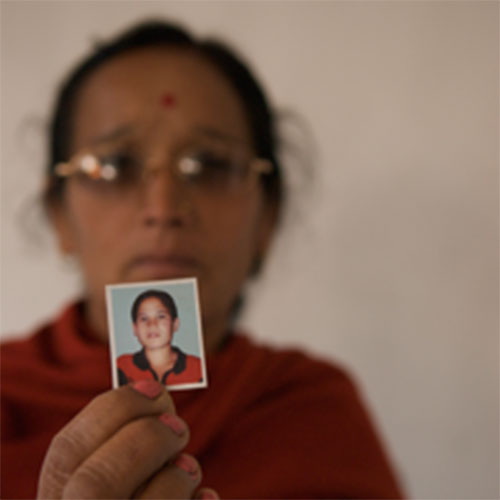17-year-old girl executed by soldiers in 2004
FACTS

On 12 February 2004, Royal Nepal Army soldiers dragged a 17-year-old schoolgirl, Subhadra Chaulagain, from her house in the middle of the night. She was questioned outside over a period of several hours, and finally shot in the head and stomach at point blank range and in front of her father. The soldiers kicked her body and then proceeded to brutally beat her father, leaving him for dead.
Read more: here
Procedure
Subhadra Chaulagain’s family reported the crime to the police and the Chief District Officer, but no action was taken. Following an investigation, Nepal’s National Human Rights Commission found that Subhadra Chaulagain had been unlawfully killed and demanded an investigation and compensation. In the face of continued inaction, Subhadra Chaulagain’s family then took the case to the Supreme Court, which ordered an investigation to be carried out, but again this was ignored.
In December 2010, Kedar Chaulagain, Subhadra’s father, filed the case with the Human Rights Committee, represented by non-governmental organisations Advocacy Forum and REDRESS. The Human Rights Committee decided the case in October 2014.
It found Nepal’s failure to investigate the violations committed against Subhadra Chaulagain, including her arrest, beating and killing, was in violation of international law, as was the beating of Kedar Chaulagain and forcing him to watch the execution of his daughter.
Read the decision: English Nepali
RECOMMENDATIONS
The Committee recommended that Nepal carry out an effective and complete investigation of the facts and prosecute and punish those guilty. It also recommended that Nepal provide full reparation, and appropriate measures of satisfaction, to Subhadra Chaulagain’s family, and avoid similar violations in the future. In addition it is required to translate the Human Rights Committee’s decision and distribute it widely.
| Investigation of the facts and prosecution and sanctions of the perpetrators | |
| Nepal has failed to adopt measures with regards to the investigation, prosecution and sanction of those responsible. Nepal continues arguing that investigation into conflict-related crimes must be carried out by transitional justice bodies in spite of the well-established case law of the Committee that recall that transitional justice mechanism cannot replace judicial remedies in cases of gross human rights violations. | |
| Reparation | |
| Although the government considers support of the interim relief as compensation, such support cannot replace the compensation victims should receive. The family of Ms. Chaulagain has not received any form of compensation for the harm suffered. | |
| Measures of satisfaction | |
| No apology or memorial has been provided. | |
| Prevention of similar violations | |
| Albeit the new Criminal Code (entered into force in 2018) codifies the autonomous offences of torture and enforced disappearance, the definitions of the crimes enshrined therein and the corresponding regulation – concerning, for instance, statutes of limitation and compensation – remains at odds with international law. Further, there are no separate or special laws on extrajudicial executions. | |
| Translation & dissemination | No information |
| The Views of the Human Rights Committee on this communication have been translated into Nepali but not disseminated widely. |
Note the gradings are made by the Human Rights Committee.
EFFORTS FOR IMPLEMENTATION
- Letter to the Human Rights Committee, November 2015
- Meeting with the Human Rights Committee, November 2015
